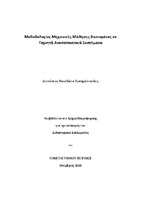Μεθοδολογίες μηχανικής μάθησης βασισμένες σε τεχνητά ανοσοποιητικά συστήματα
Artificial immune system based machine learning methodologies

Doctoral Thesis
Συγγραφέας
Σωτηρόπουλος, Διονύσιος Ν.
Ημερομηνία
2010-10Επιβλέπων
Τσιχριντζής, ΓεώργιοςΠροβολή/
Λέξεις κλειδιά
Αναγνώριση προτύπων ; Τεχνητά ανοσοποιητικά συστήματα ; Γενετικοί αλγόριθμοι ; Μηχανική μάθηση ; Ταξινόμηση ; Pattern recognition ; Artificial Immune Systems ; Genetic algorithms ; Machine learning ; ClassificationΠερίληψη
Η παρούσα διδακτορική διατριβή έγκειται στον ευρύτερο ερευνητικό τομέα της Αναγνώρισης
Προτύπων και στοχεύει στην θεωρητική και πειραματική απόδειξη της εγκυρότητας των Τεχνητών
Ανοσοποιητικών Συστημάτων ως ένα εναλλακτικό υπόδειγμα μηχανικής μάθησης. Η κύρια πηγή
έμπνευσης για τη δημιουργία των Τεχνητών Ανοσοποιητικών Συστημάτων είναι το Προσαρμοστικό
Ανοσοποιητικό Σύστημα των σπονδυλωτών οργανισμών το οποίο συνιστά ένα από τα πιο
εξελιγμένα βιολογικά συστήματα. Συγκεκριμένα, το Προσαρμοστικό Ανοσοποιητικό Σύστημα έχει
προσαρμοστεί μέσω της βιολογικής εξέλιξης κατά τέτοιο τρόπο έτσι ώστε να είναι σε θέση να
επιτελεί συνεχώς τη διαδικασία της διάκρισης του εαυτού από τον μη-εαυτό η οποία συνιστά ένα
ταξινομητικό πρόβλημα εξαιρετικής ταξικής ανισορροπίας. Η τρέχουσα διδακτορική διατριβή
εστιάζει στην αντιμετώπιση των θεμελιωδών προβλημάτων με τα οποία ασχολείται η αναγνώριση
προτύπων μέσω της ανάπτυξης αλγορίθμων μηχανικής μάθησης οι οποίοι βασίζονται στα
βιολογικά ανοσοποιητικά συστήματα. Ως εκ τούτου, η σχετική έρευνα ενδιαφέρεται ιδιαίτερα για
την διατύπωση εναλλακτικών μεθοδολογιών μηχανικής μάθησης για τα προβλήματα της
Ομαδοποίησης, της Ταξινόμησης και της Μονοταξικής Ταξινόμησης και την μέτρηση της
αποτελεσματικότητάς τους σε σύγκριση με τις πλέον σύγχρονες μεθοδολογίες όπως αυτής των
Μηχανών Διανυσματικής Υποστήριξης. Η Ταξινόμηση προτύπων μελετάται ειδικότερα μέσα στο
πλαίσιο της Ταξικής Ανισορροπίας η οποία αφορά προβλήματα για τα οποία τα σύνολα των
δεδομένων εκπαίδευσης είναι εξαιρετικά ασύμμετρα. Τα πειραματικά δεδομένα που
παρουσιάζονται στην παρούσα διατριβή περιλαμβάνουν εκφυλισμένα δυαδικά προβλήματα
ταξινόμησης όπου η κλάση ενδιαφέροντος προς αναγνώριση είναι γνωστή μέσω ενός
περιορισμένου αριθμού θετικών δειγμάτων. Με άλλα λόγια, η κλάση στόχος καταλαμβάνει μόνο
ένα μέρος αμελητέου όγκου από τον συνολικό χώρο των προτύπων ενώ ο συμπληρωματικός
χώρος των αρνητικών προτύπων παραμένει εντελώς άγνωστος κατά την διαδικασία της
εκπαίδευσης. Η επίδραση του φαινομένου της Ταξικής Ανισορροπίας στην επίδοση του
προτεινόμενου ανοσοποιητικού αλγορίθμου ταξινόμησης αποτελεί έναν επιπλέον στόχο της
τρέχουσας διατριβής. Το γενικό πλαίσιο πειραματισμού που υιοθετήθηκε σε αυτή την διδακτορική
διατριβή, προκειμένου να αποτιμηθεί η αποτελεσματικότητα των προτεινόμενων αλγορίθμων,
Ομαδοποίησης, Ταξινόμησης και Μονοταξικής Ταξινόμησης περιλαμβάνει μια ελεύθερη συλλογή
χιλίων (1000) μουσικών κομματιών από δέκα (10) μουσικολογικές κλάσεις δυτικής μουσικής. Η
συλλογή αυτή, ειδικότερα, έχει χρησιμοποιηθεί εκτενώς σε εφαρμογές που αφορούν στην
ανάκτηση μουσικής πληροφορίας και στην ταξινόμηση ως προς το μουσικολογικό είδος [221,135].
Η λίστα που ακολουθεί συνοψίζει τα προβλήματα αναγνώρισης προτύπων που απευθύνθηκαν στην
παρούσα διδακτορική διατριβή μέσω της εφαρμογής εξειδικευμένων αλγορίθμων μηχανικής
μάθησης οι οποίοι σχεδιάστηκαν ως βασισμένοι στις αρχές των βιολογικών ανοσοποιητικών
συστημάτων. 1. Artificial Immune System-Based music piece clustering and Database Organization [202,201]. 2. Artificial Immune System-Based Customer Data Clustering in an e-Shopping application
[203]. 3. Artificial Immune System-Based Music Genre Classification [200]. 4. A Music Recommender Based on Artificial Immune Systems [125]. Τα πειραματικά αποτελέσματα που παρουσιάζονται σε αυτή τη διδακτορική διατριβή
αποδεικνύουν την εγκυρότητα των Τεχνητών Ανοσοποιητικών Συστημάτων ως ένα εναλλακτικό
υπόδειγμα Μηχανικής Μάθησης.


